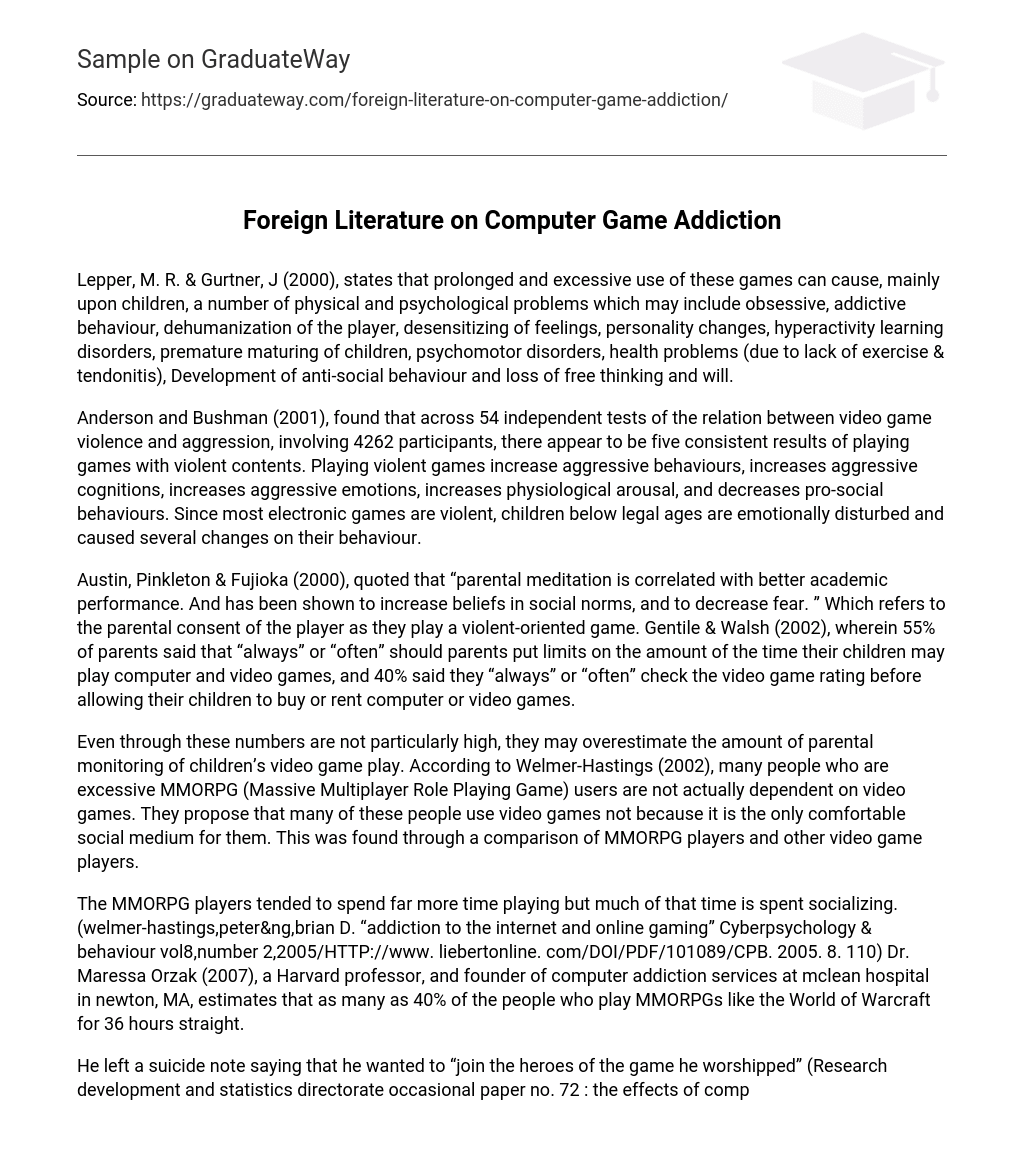Lepper, M. R. & Gurtner, J (2000), states that prolonged and excessive use of these games can cause, mainly upon children, a number of physical and psychological problems which may include obsessive, addictive behaviour, dehumanization of the player, desensitizing of feelings, personality changes, hyperactivity learning disorders, premature maturing of children, psychomotor disorders, health problems (due to lack of exercise & tendonitis), Development of anti-social behaviour and loss of free thinking and will.
Anderson and Bushman (2001), found that across 54 independent tests of the relation between video game violence and aggression, involving 4262 participants, there appear to be five consistent results of playing games with violent contents. Playing violent games increase aggressive behaviours, increases aggressive cognitions, increases aggressive emotions, increases physiological arousal, and decreases pro-social behaviours. Since most electronic games are violent, children below legal ages are emotionally disturbed and caused several changes on their behaviour.
Austin, Pinkleton & Fujioka (2000), quoted that “parental meditation is correlated with better academic performance. And has been shown to increase beliefs in social norms, and to decrease fear. ” Which refers to the parental consent of the player as they play a violent-oriented game. Gentile & Walsh (2002), wherein 55% of parents said that “always” or “often” should parents put limits on the amount of the time their children may play computer and video games, and 40% said they “always” or “often” check the video game rating before allowing their children to buy or rent computer or video games.
Even through these numbers are not particularly high, they may overestimate the amount of parental monitoring of children’s video game play. According to Welmer-Hastings (2002), many people who are excessive MMORPG (Massive Multiplayer Role Playing Game) users are not actually dependent on video games. They propose that many of these people use video games not because it is the only comfortable social medium for them. This was found through a comparison of MMORPG players and other video game players.
The MMORPG players tended to spend far more time playing but much of that time is spent socializing. (welmer-hastings,peter&ng,brian D. “addiction to the internet and online gaming” Cyberpsychology & behaviour vol8,number 2,2005/HTTP://www. liebertonline. com/DOI/PDF/101089/CPB. 2005. 8. 110) Dr. Maressa Orzak (2007), a Harvard professor, and founder of computer addiction services at mclean hospital in newton, MA, estimates that as many as 40% of the people who play MMORPGs like the World of Warcraft for 36 hours straight.
He left a suicide note saying that he wanted to “join the heroes of the game he worshipped” (Research development and statistics directorate occasional paper no. 72 : the effects of computer games on young children) Chou and Hsiao of Taiwan (2000), investigated students’ self-assessment on computer gaming and its impact on their lives. They found out that those deemed computer addicts reported more negative consequences on their studies and daily routines that did those deemed addicts. (http://people. uncw. edu/caropresoe/EDN523/Review_of_the_reasearch_on_Internet_games_addiction. df) A correlation study of Anderson and Dill (2000), found that associations between violent video game play and aggressive behaviour and delinquency were stronger for those who were characteristically aggressive. This interaction of violent content with trait hostility is important because it suggests that the harmful effects of playing violent games may be even greater for children who are already at higher risk for aggressive behaviour. (The effects of violent video game habits on adolescent hostility, aggressive behaviours, and school performance)





